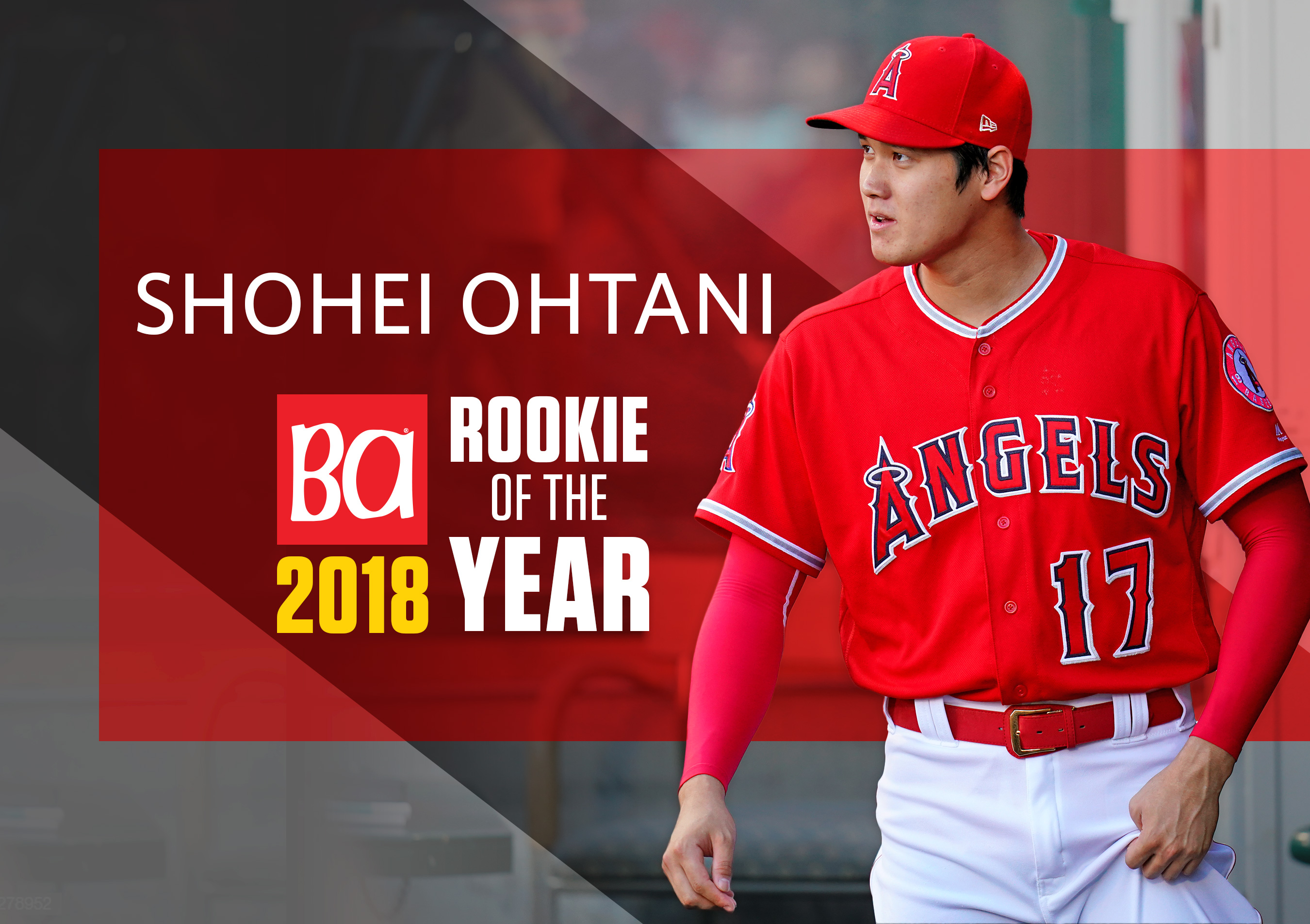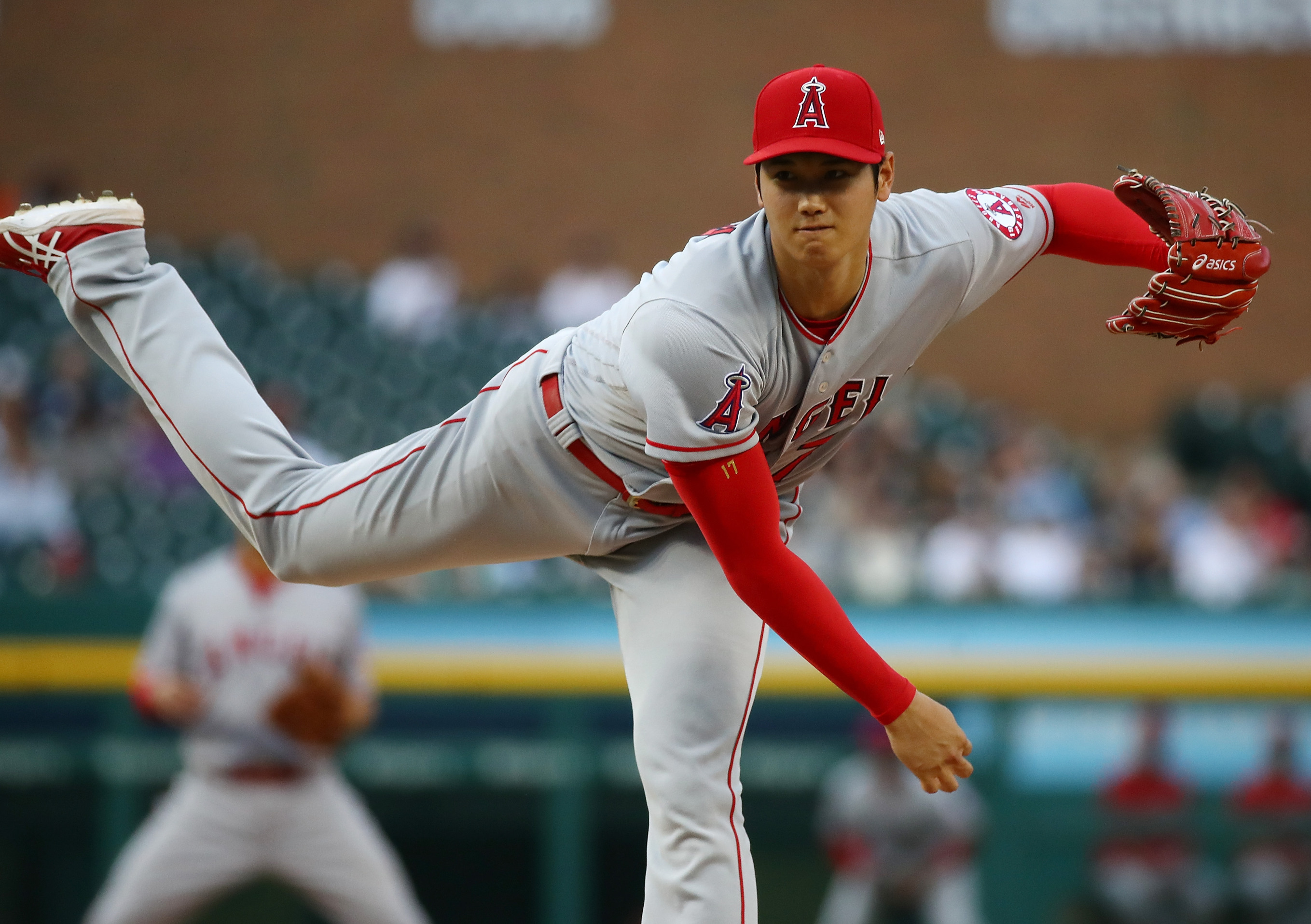2018 MLB Rookie Of The Year: Shohei Ohtani


Billy Eppler still remembers when he first saw Shohei Ohtani on a baseball field. The Angels’ general manager couldn’t forget it if he tried.
The year was 2013, Ohtani’s rookie season in Nippon Professional Baseball. Eppler was a Yankees assistant general manager on a trip to scout players across Japan, namely Rakuten Eagles righthander Masahiro Tanaka.
Eppler’s charge was to focus on priority targets eligible to come to the United States in the near future. Ohtani, just 18 years old, was too young to be one of them.
But every time Eppler beared down on another player, Ohtani kept popping up, swerving into Eppler’s field of vision and demanding his attention. An executive in title but scout at heart, Eppler couldn’t help but look again and again at the tall, gangly teenager playing both ways as a hitter and pitcher.
“It was a very explosive-looking athlete, kind of had everything you wanted,” Eppler recalled. “If you have a scouting background you really enjoy watching tools. To see those types of tools on both sides of the inning come from the same person was unique. That’s the best way to put it. It was something you hadn’t seen before.”
Eppler was hardly alone in that assessment, which was reinforced to him in follow-up trips to Japan in 2014 and 2015. Dozens of other evaluators across baseball felt the same way, setting the stage for a highly anticipated move to MLB.
When the move finally came this season, Ohtani showed the wider baseball world that he was, indeed, unlike anything they’d seen before.
Ohtani, 24, delivered a nearly unprecedented season as a rookie with the Angels, simultaneously excelling as both a hitter and pitcher and shattering all notions about what is possible in today’s game. Even considering Ohtani was limited to 10 starts and just over a half-season’s worth of plate appearances due to injury and the demands of juggling both roles, his performance stands out as historic.
Ohtani hit .285 with a .925 OPS and 22 home runs in 367 plate appearances (a 34-homer pace), numbers in line with D-backs all-star slugger Paul Goldschmidt.
He delivered a 3.31 ERA, 11.0 strikeouts per nine innings and a 1.16 WHIP on the mound, numbers in line with Yankees ace Luis Severino.
Ohtani joined Babe Ruth in 1919 as the only players in major league history to hit 15 home runs and pitch 50 innings in a season. He became the first player with 15 home runs and 50 pitching strikeouts in a season, something not even Ruth accomplished.
For living up to impossible expectations and starring as both a pitcher and hitter at the highest level of baseball in the world, Ohtani is the 2018 Baseball America Rookie of the Year.
“I didn’t really know what to expect here, so I didn’t really set any expectations for myself,” Ohtani said through interpreter Ippei Mizuhara in an exclusive, one-on-one interview with Baseball America. “But once I got here, I feel like I got the level of competition early, even though there were some struggles.”
Ah yes, those struggles. For a brief moment, it looked like the hype was too good to be true.
Ohtani entered spring training with the eyes of the baseball world watching him, and he promptly struck out 10 times in 32 at-bats in the Cactus League while getting pummeled on the mound, even in minor league “B” games. It got so bad opposing evaluators questioned if he’d be best served starting in the minors. Hitting and pitching at the same time in Japan was one thing, but this was the major leagues, and a century of history said it could not be done.
Eppler and the Angels, however, never wavered.
“There was a lot of confidence, and I think a lot of our mindset, perhaps it has something to do with the scouting background, was trust the tools,” Eppler said. “Guys that I had been around in baseball that helped developed me, the Bill Liveseys and the Gene Michaels, it was ‘trust the tools, trust the tools,’ and the tools were out of this world. And the performance at, again, the level that is closest to the majors leagues as you can get (NPB) was out of this world. So all signs were pointing toward you letting this guy get an opportunity to go do what he does.”
Once the games actually began to count, it took Ohtani all of one week to silence his skeptics.

In his first career start, Ohtani beat the Athletics with six strong innings, touching 99.6 mph. He followed by hitting a home run in each of his next three games, including a 400-foot shot to the opposite field off reigning AL Cy Young Award winner Corey Kluber. And then he delivered his coup de grace, taking a perfect game into the seventh inning against the A’s in his first home start and finishing with seven scoreless frames, one hit allowed and 12 strikeouts.
It was a definitive statement, one that put the questions to rest. Yes, it was possible to excel as a pitcher and a hitter at the same time in the major leagues today.
And yes, Ohtani was the man to do it.
“I have no satisfaction showing (people) up or anything like that because looking at my numbers during spring training, I can’t really blame them for saying those type of things,” Ohtani said. “Maybe I really was not major league-ready at that time. But that time was really important to me now that I look back at it. Without those struggles, maybe I wouldn’t have had success this year. I tried to take positive stuff out of it.”
Ohtani’s feats continued throughout the season.
There was the 11 strikeouts in 6.1 innings against the Twins. There was the nine strikeouts in 7.2 dominant innings against the Mariners. There was the run of five consecutive starts allowing two earned runs or less, the 15 home runs of at least 410 feet and, oh by the way, 10 stolen bases.
As long as his body allowed him, Ohtani impacted the game both ways unlike anything seen in almost a century.
“He was as advertised, if not more,” Athletics manager Bob Melvin said. “I was a little bit skeptical. You saw the pitching end of it, we saw early on how dominant he can be, and anybody who throws 100 miles an hour with a plus split and good breaking stuff is going to have success and he did, and I think we were the team that saw it the most.
“But I didn’t know he was going to be this good a hitter. You look at the numbers and you say ‘Yeah, this is a true two-way guy who’s fast and has got some power, but would both ends of it translate here?’ And it absolutely has. He’s a force at the plate. He’s a unique athlete for this game and probably better than we expected.”
But there was a caveat. Ohtani’s body didn’t allow him to do it for long.
Ohtani had a partial tear in his right ulnar collateral ligament when he signed with the Angels and further damaged it during the season, limiting him to 51.2 innings. He had Tommy John surgery after the season and will be unable to pitch all of 2019, though the plan is for him to continue to hit through the season as the Angels’ designated hitter.
The Angels were prepared for this eventuality. They did everything in their power to prevent it, collecting physical and medical data from Ohtani every single day and making decisions to play him or not based on that info, as well as feedback from Ohtani himself.
But Ohtani’s UCL still tore despite that level of care and vigilance, and Eppler even admits it wasn’t entirely unforeseen.
“One of the questions I asked Shohei very, very early in the process, I asked him ‘When was the first time you touched 97 miles an hour?’ and he said ‘16 or 17’,” Eppler said. “And I said OK, it kind of fits the bill. It’s been eight years of throwing at an extreme velocity, and that’s kind of normal, it’s not irregular, for a ligament to start getting compromised after that many years of throwing that hard. … The elbow did not go because of a singular event. The elbow went because of the totality of the work over those eight years of him being able to throw over or touch 97 miles an hour.”
The question now becomes whether Ohtani can physically handle pitching and hitting at the same time over a full major league season.
Ohtani has not pitched 150 innings in a season since 2015 in Japan. By the time he returns to the mound in 2020, it will be five years since he handled a major league-level pitching workload.
Even Ruth, the standard-bearer for two-way excellence, eventually settled on one. After hitting 20 home runs for the first time in 1919 as a 24-year-old—the same age Ohtani is now—Ruth pitched only five more games the rest of his career. (Although Ruth also did not have the DH available to him).
Eppler is definitive: As soon as Ohtani’s elbow is healed, he will return to the mound as a starter while continuing to hit in the middle of the Angels lineup.
“I want him out there doing both disciplines because that’s what he’s trained for,” Eppler said. “I know that’s a goal of his and I think now that people have seen it, I think it’s a goal of everybody to continue to see him do that.
“It’s hard to say an exact workload. There’s been models in what he’s done in Japan, I think those are pretty good thumbprints to look at it. Sometimes that can end in 130-150 innings on the mound and somewhere between 280-350 plate appearances. It really varies. But he’s impactful on both sides and we want to try to maximize his ability to impact the game and be out there as much as possible.”
Ohtani, for his part, is just focusing on the near future.
“I got the injury so in that case it wasn’t a fully satisfying season,” Ohtani said.
“Since I got hurt and am going to be not pitching next year, my initial plans or goals have kind of changed. As a pitcher, my focus is to go through the rehab and try to make it back in 2020 as an even better pitcher than I was in the past. As a hitter, I just want to concentrate next year on trying to play full time and obviously try to make the postseason and win the World Series. That’s my biggest goal.”
There is understandable skepticism Ohtani can hold long-term up over such a dual workload. Then again, there was understandable skepticism that anyone could excel as both a starting pitcher and hitter in Major League Baseball today for any extended capacity, and Ohtani did so in spectacular fashion.
With an exhilarating rookie season, Ohtani lived up to all the hype. He pitched like an ace and hit like an All-Star, and reset the standard for what is, in fact, achievable in the game today.

Comments are closed.